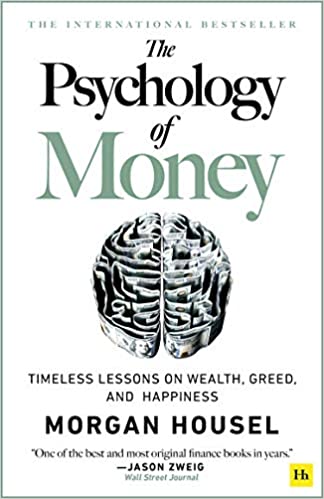This post is part of the 📖 The Psychology of Money series.
Today, I am reading Wealth is What You Don’t See chapter from the book The Psychology of Money: Timeless lessons on wealth, greed, and happiness written by Author, Morgan Housel.
Doing well with money isn’t necessarily about what you know. It’s about how you behave. And behavior is hard to teach, even to really smart people.
In The Psychology of Money, award-winning author Morgan Housel shares 19 short stories exploring the strange ways people think about money and teaches you how to make better sense of one of life’s most important topics.
Yesterday, I finished reading the eigth short story Man in the Car Paradox from the book The Psychology of Money.
Wealth is What You Don’t See
Spending money to show people how much money you have is the fastest way to have less money.
Money has many ironies. Here’s an important one: Wealth is what you don’t see.
Someone driving a $100,000 car might be wealthy. But the only data point you have about their wealth is that they have $100,000 less than they did before they bought the car (or $100,000 more in debt). That’s all you know about them.
Modern capitalism makes helping people fake it until they make it a cherished industry. But the truth is that wealth is what you don’t see.
Wealth is the nice cars not purchased. The diamonds not bought. The watches not worn, the clothes forgone, and the first-class upgrade declined.
The only way to be wealthy is not to spend the money that you do have. It’s not just the only way to accumulate wealth; it’s the very definition of wealth.
Rich is a current income. Someone driving a $ 100,000 car is almost undoubtedly rich because even if they purchased the car with debt, you need a certain level of income to afford the monthly payment.
But wealth is hidden. It’s income not spent. Wealth is an option not yet taken to buy something later. Its value lies in offering you choices, flexibility, and growth to one day purchase more stuff than you could right now.
Key Takeaways
- Wealth is financial assets that haven’t yet been converted into the stuff you see.
That’s it for today. Tomorrow, we will read the next chapter Save Money, the only factor you can control generates one of the only things that matter. How wonderful.
No One’s Crazy
Every decision people make with money is justified by taking the information they have at the moment and plugging it into their unique mental model of how the world works.
Luck & Risk
Nothing is as good or as bad as it seems. More important is that as much as we recognize the role of luck in success, the role of risk means we should forgive ourselves and leave room for understanding when judging failures.
Never Enough
There are many things never worth risking, no matter the potential gain. Knowing when you have “enough” is an invaluable skill. Building a sense for “enough” is remarkably simple: Stop taking risks that might harm your reputation, family, freedom and independence.
Don’t forget that being loved by those “whom you want to love” is invaluable than risking everything for money.
Confounding Compounding
Good investing isn’t necessarily about earning the highest returns. It’s about earning pretty good returns that you can stick with and which can be repeated for the longest period of time.
Getting Wealthy vs Staying Wealthy
Good investing is not necessarily about making good decisions. It’s about consistently not screwing up. There are a million ways to get wealthy and plenty of books on how to do so. But there’s only one way to stay wealthy: some combination of frugality and paranoia.
Getting money is one thing. Keeping it is another. If you have to summarize money success in a single word, it would be “survival”.
Tails, You Win
Gains come from a small per cent of your actions called “Long Tail Events”. You can be wrong half the time and still make a fortune. Remember, tails drive everything. Just do the average thing when all those around you are going crazy.
Freedom
Controlling your time is the highest dividend money pays. The ability to do what you want, when you want, with who you want, for as long as you want, is priceless. It is the highest dividend money pays.
Man in the Car Paradox
If respect and admiration are your goals, be careful how you seek them. Humility, kindness, and empathy will bring you more respect than horsepower ever will.
Wealth is What You Don’t See
Wealth is hidden. It’s income not spent. Wealth is an option not yet taken to buy something later. Its value lies in offering you choices, flexibility, and growth to one day purchase more stuff than you could right now.
Buy or not to buy
If you want to be wealthy and then stay at the totem pole forever, you must immediately read this book. I bought several copies of this book to gift friends and family. It’s an easy read with a lot of anecdotes and real-life lessons. I already implemented several hacks in my life whistle taking investment decisions.
Author(s): Morgan Housel
Part 11 of 23 in the 📖 The Psychology of Money book series.
Series Start | The Psychology of Money: Timeless lessons on wealth, greed, and happiness - Day 10 | The Psychology of Money: Timeless lessons on wealth, greed, and happiness - Day 12
